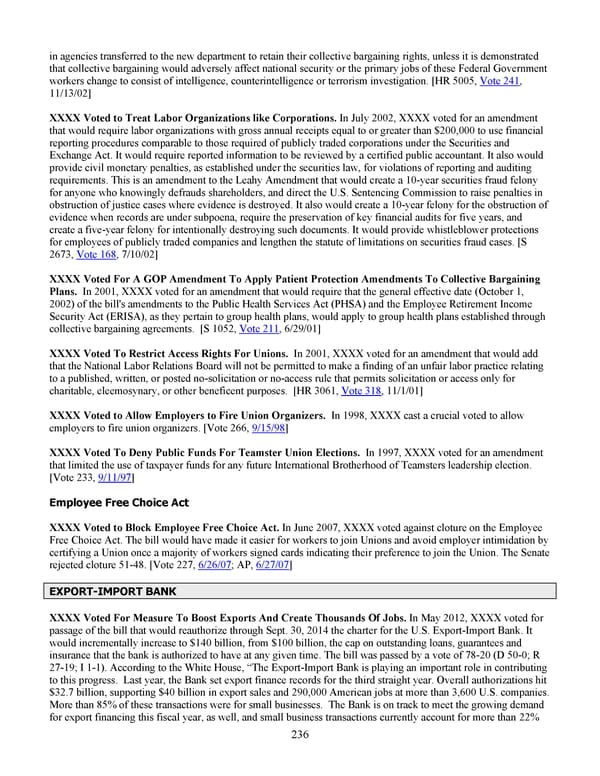in agencies transferred to the new department to retain their collective bargaining rights, unless it is demonstrated that collective bargaining would adversely affect national security or the primary jobs of these Federal Government workers change to consist of intelligence, counterintelligence or terrorism investigation. [HR 5005, Vote 241, 11/13/02] XXXX Voted to Treat Labor Organizations like Corporations. In July 2002, XXXX voted for an amendment that would require labor organizations with gross annual receipts equal to or greater than $200,000 to use financial reporting procedures comparable to those required of publicly traded corporations under the Securities and Exchange Act. It would require reported information to be reviewed by a certified public accountant. It also would provide civil monetary penalties, as established under the securities law, for violations of reporting and auditing requirements. This is an amendment to the Leahy Amendment that would create a 10-year securities fraud felony for anyone who knowingly defrauds shareholders, and direct the U.S. Sentencing Commission to raise penalties in obstruction of justice cases where evidence is destroyed. It also would create a 10-year felony for the obstruction of evidence when records are under subpoena, require the preservation of key financial audits for five years, and create a five-year felony for intentionally destroying such documents. It would provide whistleblower protections for employees of publicly traded companies and lengthen the statute of limitations on securities fraud cases. [S 2673, Vote 168, 7/10/02] XXXX Voted For A GOP Amendment To Apply Patient Protection Amendments To Collective Bargaining Plans. In 2001, XXXX voted for an amendment that would require that the general effective date (October 1, 2002) of the bill's amendments to the Public Health Services Act (PHSA) and the Employee Retirement Income Security Act (ERISA), as they pertain to group health plans, would apply to group health plans established through collective bargaining agreements. [S 1052, Vote 211, 6/29/01] XXXX Voted To Restrict Access Rights For Unions. In 2001, XXXX voted for an amendment that would add that the National Labor Relations Board will not be permitted to make a finding of an unfair labor practice relating to a published, written, or posted no-solicitation or no-access rule that permits solicitation or access only for charitable, eleemosynary, or other beneficent purposes. [HR 3061, Vote 318, 11/1/01] XXXX Voted to Allow Employers to Fire Union Organizers. In 1998, XXXX cast a crucial voted to allow employers to fire union organizers. [Vote 266, 9/15/98] XXXX Voted To Deny Public Funds For Teamster Union Elections. In 1997, XXXX voted for an amendment that limited the use of taxpayer funds for any future International Brotherhood of Teamsters leadership election. [Vote 233, 9/11/97] Employee Free Choice Act XXXX Voted to Block Employee Free Choice Act. In June 2007, XXXX voted against cloture on the Employee Free Choice Act. The bill would have made it easier for workers to join Unions and avoid employer intimidation by certifying a Union once a majority of workers signed cards indicating their preference to join the Union. The Senate rejected cloture 51-48. [Vote 227, 6/26/07; AP, 6/27/07] EXPORT-IMPORT BANK XXXX Voted For Measure To Boost Exports And Create Thousands Of Jobs. In May 2012, XXXX voted for passage of the bill that would reauthorize through Sept. 30, 2014 the charter for the U.S. Export-Import Bank. It would incrementally increase to $140 billion, from $100 billion, the cap on outstanding loans, guarantees and insurance that the bank is authorized to have at any given time. The bill was passed by a vote of 78-20 (D 50-0; R 27-19; I 1-1). According to the White House, “The Export-Import Bank is playing an important role in contributing to this progress. Last year, the Bank set export finance records for the third straight year. Overall authorizations hit $32.7 billion, supporting $40 billion in export sales and 290,000 American jobs at more than 3,600 U.S. companies. More than 85% of these transactions were for small businesses. The Bank is on track to meet the growing demand for export financing this fiscal year, as well, and small business transactions currently account for more than 22% 236
 HRC vote skeleton Page 253 Page 255
HRC vote skeleton Page 253 Page 255